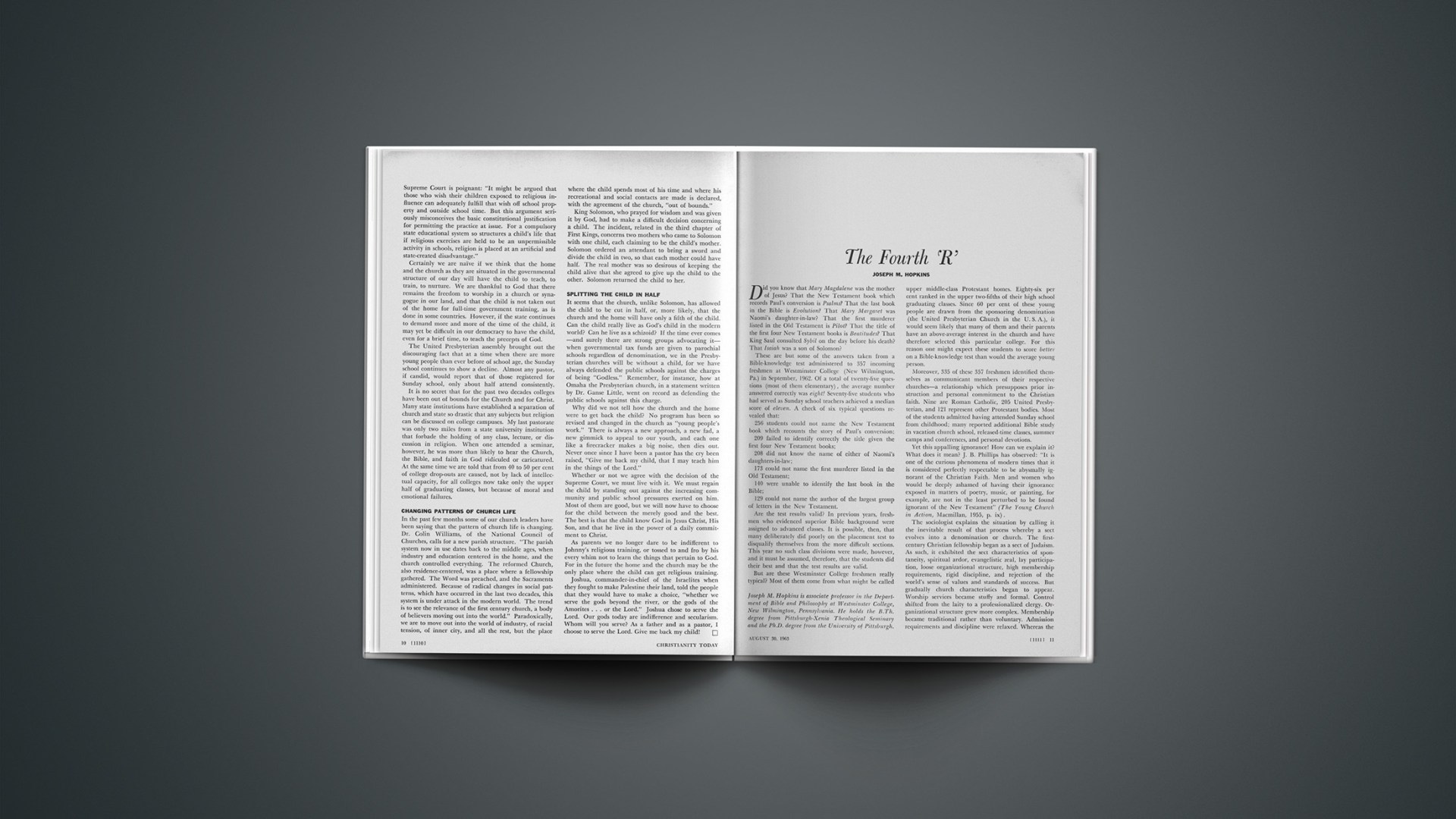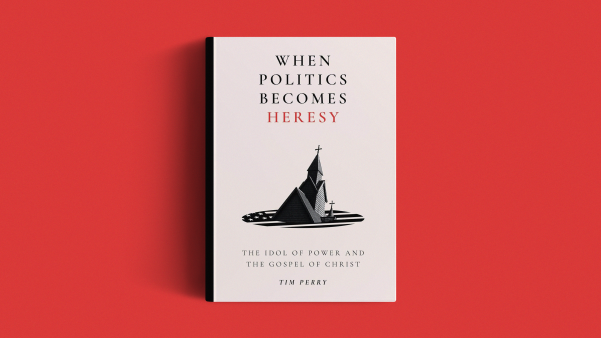Did you know that Mary Magdalene was the mother of Jesus? That the New Testament book which records Paul’s conversion is Psalms? That the last book in the Bible is Evolution? That Mary Margaret was Naomi’s daughter-in-law? That the first murderer listed in the Old Testament is Pilot? That the title of the first four New Testament books is Beatitudes? That King Saul consulted Sybil on the day before his death? That Isaiah was a son of Solomon?
These are but some of the answers taken from a Bible-knowledge test administered to 357 incoming freshmen at Westminster College (New Wilmington, Pa.) in September, 1962. Of a total of twenty-five questions (most of them elementary), the average number answered correctly was eight! Seventy-five students who had served as Sunday school teachers achieved a median score of eleven. A check of six typical questions revealed that:
256 students could not name the New Testament book which recounts the story of Paul’s conversion;
209 failed to identify correctly the title given the first four New Testament books;
208 did not know the name of either of Naomi’s daughters-in-law;
173 could not name the first murderer listed in the Old Testament;
140 were unable to identify the last book in the Bible;
129 could not name the author of the largest group of letters in the New Testament.
Are the test results valid? In previous years, freshmen who evidenced superior Bible background were assigned to advanced classes. It is possible, then, that many deliberately did poorly on the placement test to disqualify themselves from the more difficult sections. This year no such class divisions were made, however, and it must be assumed, therefore, that the students did their best and that the test results are valid.
But are these Westminster College freshmen really typical? Most of them come from what might be called upper middle-class Protestant homes. Eighty-six per cent ranked in the upper two-fifths of their high school graduating classes. Since 60 per cent of these young people are drawn from the sponsoring denomination (the United Presbyterian Church in the U. S. A.), it would seem likely that many of them and their parents have an above-average interest in the church and have therefore selected this particular college. For this reason one might expect these students to score better on a Bible-knowledge test than would the average young person.
Moreover, 335 of these 357 freshmen identified themselves as communicant members of their respective churches—a relationship which presupposes prior instruction and personal commitment to the Christian faith. Nine are Roman Catholic, 205 United Presbyterian, and 121 represent other Protestant bodies. Most of the students admitted having attended Sunday school from childhood; many reported additional Bible study in vacation church school, released-time classes, summer camps and conferences, and personal devotions.
Yet this appalling ignorance! How can we explain it? What does it mean? J. B. Phillips has observed: “It is one of the curious phenomena of modern times that it is considered perfectly respectable to be abysmally ignorant of the Christian Faith. Men and women who would be deeply ashamed of having their ignorance exposed in matters of poetry, music, or painting, for example, are not in the least perturbed to be found ignorant of the New Testament” (The Young Church in Action, Macmillan, 1955, p. ix).
The sociologist explains the situation by calling it the inevitable result of that process whereby a sect evolves into a denomination or church. The first-century Christian fellowship began as a sect of Judaism. As such, it exhibited the sect characteristics of spontaneity, spiritual ardor, evangelistic zeal, lay participation, loose organizational structure, high membership requirements, rigid discipline, and rejection of the world’s sense of values and standards of success. But gradually church characteristics began to appear. Worship services became stuffy and formal. Control shifted from the laity to a professionalized clergy. Organizational structure grew more complex. Membership became traditional rather than voluntary. Admission requirements and discipline were relaxed. Whereas the sect had been in conflict with society, the church began to accommodate itself to worldly values and success standards.
Second-Hand Religion
In view of this transition, the twentieth-century prevalence of second-hand religion, with its accompanying apathy toward religious education, should come as no surprise. While accepted in theory, the faith which most people so easily profess is denied in practice. Parents who agree that “the fear of the Lord is the beginning of wisdom” nevertheless fail to provide religious instruction for their children. Most church-going (to say nothing of church-belonging-but-not-going) parents glibly covenant to rear their children in “the nurture and admonition of the Lord” without the slightest intention of fulfilling this vow.
Several years ago two couples who had been delinquent in their church attendance asked me to baptize their infant children. I agreed to do so only on the condition that they make the sacrament an occasion for recommitting their lives to Christ and assure me of their intention to keep faithfully the covenant promises—which I then carefully explained. All four parents assented, whereupon I administered the sacrament. Neither couple has been inside the church since!
What does this irresponsibility signify? That religion in American life has deteriorated to the level of the merely cultural. Social custom dictates that babies be baptized, that children “join the church,” that young couples be married by a clergyman, that deceased loved ones receive Christian burial. Often these ceremonies are performed with a minimum of religious significance for the persons involved. Many ministers, moreover, by administering church sacraments and covenants indiscriminately, have made the Church itself a party to the downgrading and decline of religion.
The most damning heresy of our time is that of admitting God’s existence while denying his relevance. We are guilty of fencing God off from life, of isolating him to the circumscribed confines of a particular building. A religion that is unrelated to what a man does outside of church can hardly be expected to enlist his undying devotion, or that of his children. Still less can it be expected to stimulate in its adherents a desire to study seriously its literature and teachings.
It is no mere coincidence that the growth of the secular mind has been paralleled by a similar growth in the concept of the secular state. Each has contributed to the development of the other. For a state to be religiously neutral is an impossible paradox. A government which fails to encourage faith encourages non-faith; when it leans over backwards to avoid discrimination against any religion, it willy-nilly discriminates against all religions.
Let the church and the home teach religion, say advocates of the secular state. But what are the odds that parents reared in a religiously emasculated culture will devote themselves to this task? And what are the odds that the few parents who do will be successful? Already imbued with secularism, our society has demoted religion to an extra-curricular status. As a result, today’s children feel imposed upon when asked to devote their “free” time to Bible study. Such a situation, accordingly, makes the task of religious education extremely difficult, in both home and church.
Even released-time classes in religious education are viewed with a take-it-or-leave-it attitude by many church-member parents and their children. A boy who was given a poor grade for his work in a sixth-grade released-time class complained to his mother. She thereupon sent a note to the teacher and requested that the boy be withdrawn from the course. Would it ever have occurred to this mother to ask permission for her son to drop English or history if he didn’t like the subject or received a low grade in it? The fact that many church people did not enroll their children in released-time classes indicates the low priority given to religious education in allegedly Christian homes.
What is the answer? How can the Bible be elevated to at least the level of the arithmetic text? Certainly not by continuing to widen the gap between the sacred and the secular. This deplorable trend must be reversed. Only as the state declares itself honestly on the side of moral and spiritual values can the church and the home be expected to do an effective job of Christian education. This is no argument for a state church—or for the suppression of religious or anti-religious minorities. Such a declaration, rather, is the acknowledgment that faith in God is the will of the people and therefore the official policy of government.
The Myth Of Neutrality
It is ironic that much of the insistence upon extreme church-state separation has come not from atheists but from ecclesiastical leaders. One of their principal arguments is that a lowest-common-denominator faith, one which dilutes theology to a content acceptable to all religious groups, is to be abhorred because it fosters superficial, shallow religion. In answer let it be said that “the fear of the Lord is the beginning of wisdom.” In committing itself to faith in God—and leaving the content of that faith to be amplified by the various religious groups which comprise our society—the nation encourages its citizens at least to acknowledge God and to cultivate attitudes of reverence, dependence, and love toward him. This approach is of fundamental importance, for it lays a spiritual foundation upon which all faiths may build. When government fails to encourage religious faith it actually undermines faith; such failure conveys the impression that as far as the nation is concerned God is either non-existent or irrelevant. The result of such dereliction breeds a climate which is favorable to agnosticism and atheism and consequently hostile to religion. The will of the minority thus becomes the rule for the majority—and, what’s more—in the name of democracy!
It is not advocated that our government deprive atheists, agnostics, and freethinkers of their constitutional rights. What is advocated is that we abandon the myth of neutrality and reaffirm our historic position of concurrence with moral and spiritual goals and values. Justice Potter Stewart, in his dissenting opinion in the celebrated Regents’ Prayer case, noted that the Supreme Court had declared in a previous decision ten years earlier, “We are a religious people whose institutions presuppose a supreme being.” By exempting church property from taxation, granting tax deductions for gifts to religious and charitable causes, maintaining military chaplains and chapels, imprinting “In God We Trust” on our coins, acknowledging our nation to be “under God” in the pledge to the flag, and in other ways our government has implemented this principle. The policy has been to provide impartial support for all religious faiths while discriminating against none.
Probing For Solutions
Released time, by which children are permitted to leave the public school for an hour each week to attend religion classes in nearby churches, is another important means of sympathetic cooperation between church and state. Recently shared time has been proposed as a more effective way of advancing the cause of religious education while safeguarding church-state separation. Under this plan, as described in a Washington Post editorial (Feb. 27, 1963), “a child whose parents desired him to do so would be allowed to attend public school part of the day for instruction in subjects free from religious connotation such as chemistry, physics, mathematics, home economics or manual training and to attend a parochial school for part of the day to study such subjects as history, social science or literature which, in their parents’ view, ought to be taught from a religious point of view; they would also, of course, receive religious instruction in the parochial school.”
The Post admits that there are serious objections to this proposal—chief of which are its cost and unwieldliness.
A much simpler solution is this: let the public schools add religion to the three R’s and integrate religious education classes into their curriculum. Like released time, the program could be financed and staffed by the churches. If administered on an elective basis, with equal opportunity for all students and all religious groups, such a plan would implement the American philosophy that our government should guarantee citizens free exercise of religion within the framework of our pluralistic society. No longer a stepchild of public education, religious education could then be given the serious attention it deserves. Religion teachers would be required to meet state educational standards; homework would be assigned, tests given, and grades awarded as in other school subjects. Ended, moreover, would be the inconvenient and time-consuming practice of taking children out of school, often to less adequate church facilities.
In addition, a clarified government policy that favors the propagation of religious faith would make it easier for public school teachers to relate belief in God to their subject matter. When a sixth-grade teacher, in discussing natural science, made frequent references to “nature,” a student inquired, “What is nature?” “Just nature,” the teacher replied with a shrug. Perhaps the teacher thought he would be violating the principle of separation of church and state if he offered a simple theological explanation. It is indeed ironic that in a nation composed of “religious people whose institutions presuppose a supreme being,” a God-fearing teacher is thus placed in a position of teaching “atheism by omission” (to borrow William Ernest Hocking’s phrase).
Further, religious material could be incorporated into such courses as history, literature, art, and music, so long as the common-denominator principle were carefully followed to avoid sectarian indoctrination. Also, religious holidays could be explained and recognized both in the classroom and in assembly programs. Christians should not object to their children’s learning about Purim or Hanukkah if such teaching were to involve no indoctrination; many Jews have indicated a similar attitude toward Christmas and Easter. In this plan, teaching about religion could be handled by the schools and teaching the content of religious faith reserved for teachers supplied by the churches.
Should this proposal sound extreme, let it be remembered that for years our nation has provided a similar service for men in the armed forces—and at government expense! The motto of the military chaplaincy reads, “Cooperation Without Compromise.” Is there any logical reason why this principle cannot be applied in an inter-faith program of religious education in the public schools—with the churches, not the taxpayers, footing the bill?
A Day Of Reckoning
The nation must ask itself, What is the logical outcome of a consistent policy of neutrality toward religion? Can the answer be anything less than the elimination of all religious expression from those aspects of public life controlled or sponsored by the government (e.g., prayers at official functions, the military chaplaincy, references to God on our money and in our patriotic songs, recognition of God in the public schools? Personally, I can think of no more effective way for America herself to fulfill Nikita Khrushchev’s prophecy, “We will bury you!”
Not merely against individuals but against an entire nation Elijah hurled the stinging rebuke: “How long will you go limping with two different opinions? If the Lord is God, follow him; but if Baal, then follow him” (1 Kings 18:21). Is not this exactly what we have been doing? We have stumbled between the opinion that God does have a place in our national life and the opinion that he does not. In our limping we have admitted him to certain areas but excluded him from others. The showdown between the religious and the secular state is upon us. We must make up our minds.










